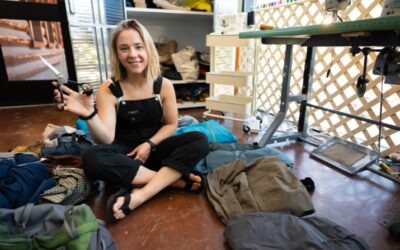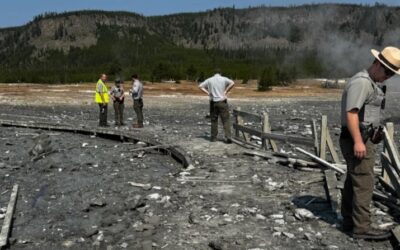As if in hibernation, Teton County’s circulatory system of commerce and tourism has slowed to bare essentials. The local workforce, disproportionately in the service industry, is increasingly out of a job. Between unemployment benefits, federal emergency relief, and community aid efforts, can it be sustained?
“Well, I can say it’s kicking my ass because I’m bored out of my mind and out of work,” said Jared Powell on the pervasive specter of COVID-19.
Powell, working on his truck outside his apartment near Flat Creek, is a supervisor or “head of the dishwashers” as he said with a grin, for the hotel and resort chain. The clock seems to be the virus’ now. He has no idea when work will start up again, although the resort’s stated goal is May 14. It typically closes during shoulder seasons, this year early.
“They told us straight up we’re not going to get our hourly pay. We can borrow from our vacation time next year but then we won’t accumulate anything.”
Powell chose unemployment insurance, and is using the influx of time to fix his wife’s and niece’s cars.
Barbie Foster, also a Four Seasons employee, says many of her neighbors are gone. Most J-1 visa holders “who work for us had to leave,” she said. Some U.S. employees have also left to join family elsewhere. Last week, workers staying at the old Pioneer Motel apartments packed their cars and suitcases and returned to Chile, Columbia, Mexico, Michigan.
Meanwhile, workers who are still here are looking for help. From March 16 to 28, 1,185 people filed for unemployment in Teton County. That’s up from only 110 new claims in all of January and February. Some are still waiting to file claims as they navigate an inundated system.
Lucia Lopez is proceeding with caution. She works as a dishwasher and said for now “it is OK, thanks to God.” She works three hours a day “maybe three days a week.” Before the pandemic, she was working nearly every day for eight hours at least. Now, her employer whom she preferred not to name, calls her when she is needed.
Despite the drastic cut in hours, Lopez insisted she and her family are managing. Like many Jacksonites KHOL spoke with, she is waiting to see how long this will last and remains philosophical.
In March, the U.S. unemployment rate shot up to 4.4% from a near 50-year low of 3.5%. Due to the COVID-19 pandemic, American workers lost 701,000 jobs. According to the Bureau of Labor Statistics, that’s the largest change in the jobless rate in a single month since 1975.
“They are in such a profoundly difficult place. Until we get past this acute phase towards a period of economic recovery, they are going to get creamed.” – economist Jonathan Schechter
Meanwhile, Jackson’s workforce faces extreme vulnerability. According to Wyoming’s Economic Analysis Division, nearly half of Teton County residents are employed in tourism, retail, lodging and restaurants.
“We have 21,000 year-round salary and wage jobs in Teton County, and 15,000 self-employed,” said Jonathan Schechter, economist, executive director of the economic and sustainability think tank, the Charture Institute, and a member of the Jackson Town Council.
Schechter said Teton County is one of six counties in the U.S. where jobs outweigh its 20,000-plus population. “There are 1.4 jobs per resident, so we’re a job-generating factory,” he said. “By extension, there are an incredible number of people without jobs.”
The demands of the service and hospitality industries result in higher numbers of employees earning lower wages, Schechter said. These workers suffer a disproportionate impact, compounded by the added expense inherent in being part of the highest income disparity experiment in the nation.
“They are in such a profoundly difficult place,” Schechter said. “Until we get past this acute phase towards a period of economic recovery, they are going to get creamed.”
Takeout Town
Local businesses face an amorphous way forward, and hard decisions. “It’s huge,” said Jim Waldrop, president and general manager at Silver Dollar, Inc., which owns the Wort Hotel and The Silver Dollar Bar. “Obviously business is not good,” he said. “We are operating on a skeleton crew. But we’re happy to keep as many employees employed as we can.”
Waldrop is trying to keep his staff busy doing jobs usually pushed to the back burner: “Things like polishing silver, things we would never be able to do when we’re open 365 days a year.” The 2,032 namesake silver dollars encased in one bar are all gleaming, and they are partway through with the 1,312 on the other. Toothpaste is the key.
Waldrop said he is “proud to still be open and supporting this community.” The Wort isn’t accepting tourist bookings but the hotel is hosting essential workers, mostly flight crews. And the Silver Dollar kitchen is open for takeout. Just this week it began offering 50% off for first responders and health care workers. “It’s been very well-received,” Waldrop said.
Down on Glenwood Street, at The Phoenix and the Dragon, owners Zarina and Eric Sakai say they are truly a “mom and pop” establishment. The two part-time employees they hired in 2019 after transitioning from the Whole Grocer to their new space felt like “an indulgence,” Zarina said.
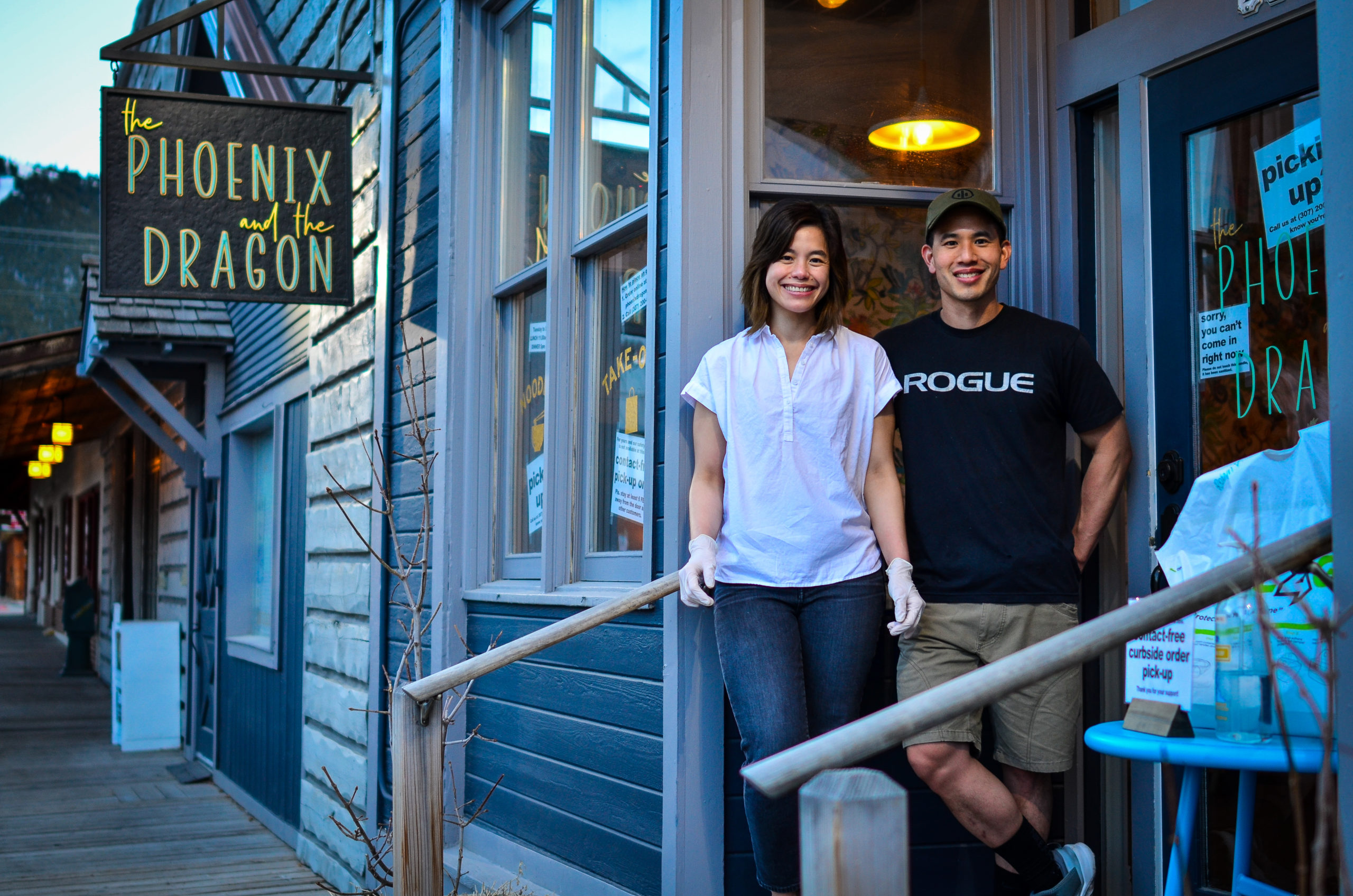
To curb the spread of COVID-19, Zarina and Eric Sakai, owners of The Phoenix and the Dragon, shifted their operation to contact-free carry-out. Since the onset of the pandemic, their business has dipped between 65 and 70 percent. (Robyn Vincent/KHOL)
The Sakais opened the restaurant with credit cards and small loans, “whatever we could get,” Zarina said. It was perhaps “not the smartest thing to do.”
“Every month in operation literally what you’re making is going directly into trying to pay back your bills or operating costs.”
Then life with the virus hit. Before Teton County enacted health orders shutting down all dine-in restaurants, the Sakais were hearing from restaurant owner friends in Seattle—not far from where the first COVID-19 case was diagnosed in the U.S.—about how they were adapting amid the pandemic. The Phoenix and the Dragon soon shifted its operation from in-house dining to takeout orders only.
Now it’s just the two of them cooking and making up to-go bags. Eric is immunocompromised and their system is completely no-contact. Call when you arrive and Zarina places your food, sealed in a bag, on the blue table sitting outside the restaurant.
(They are also offering to-go items that have become scarce during the pandemic. After learning the animal shelter was in desperate need of bleach, they tapped their distributors and added supplies to their inventory. So people can order cleaning items, toilet paper and disposable latex gloves, to name a few.)
Even in prosperous days before COVID-19, the margins of a successful restaurant were slim. In the case of the Phoenix and the Dragon, for a menu item that costs $16, almost $5 pays for the ingredients and around $4.50 for rent, leaving $7 to pay for everything else. “In a perfect world, a restaurant typically would hope that, OK, you can get 5% of that in profit—which would be like 80 cents,” Zarina said.
But in their pre-COVID lives, with Jackson food and rent costs, equipment rental, utilities, and so on, even this was not always attainable. The couple pays themselves with whatever is left.
The Sakais applied online more than one week ago for an “Economic Injury Disaster Loan,” or EIDL SBA, through the CARES Act. They also applied for a Wyoming and Montana area $5,000 small business grant. Now, they’re waiting.
Bankruptcy is a very real possibility if the loans don’t come through, Zarina said. Since closing the restaurant to dine-in customers, traffic has dropped between 65 and 70 percent. “Honestly, we’re struggling. Operating a restaurant is already challenging—margins are low and product is perishable. The current global situation has definitely exacerbated that.”
Every establishment KHOL interviewed is doing its utmost to stay afloat and help employees. Many, particularly larger operations, were reluctant to divulge specific numbers of employees cut, or projections for the future.
“We have kept on as many as we can,” said Kendra Alessandro of Fine Dining Restaurant Group. It owns and operates nine dining and culinary establishments in the valley. Of those, Bin 22 in Jackson and Bodega in Teton Village are still open for in-house purchases and delivery.
When health concerns about coronavirus surfaced, Fine Dining was among the first to shut down its eateries.
“Obviously the restaurants have closed, so a lot of serving positions and bussers and positions like that are no longer working,” Allesandro said.
They keep their team of servers, bussers, hosts, cooks, and the list goes on, updated with daily emails. “We are doing a ton to be really clear and communicate exactly what’s going on, and be open and honest with everybody as to how we’re able to support them.”
Gavin Fine, Fine Dining’s co-founder and owner, has been involved in lobbying efforts on Capitol Hill for small businesses in the hospitality industry, including negotiations for the federal relief package. The resulting CARES Act will work well for certain businesses, not all, he said. “I think the proof is going to be in the pudding.”
For the newly unemployed, Fine Dining Restaurant Group is assisting struggling workers, helping them file for unemployment, and providing discounted food. They are also providing some as-needed financial assistance to bridge the gap until benefits kick in, and directing people to other resources such as One22.
Relief Afoot?
The federal relief package, or CARES Act, gives those on unemployment an additional $600 per week. But the new legislation also offers an alternative to unemployment by funding small businesses so they can keep paying their employees. The loan program essentially pays a business’ operating costs for a period of months, theoretically retaining the structure of the business—including workers—until the economy begins to recover.
At the Bank of Jackson Hole, loan officers have been working with business owners on a case-by-case basis since the first ripples of the pandemic found Jackson one month ago. “We’ve been doing quite a few deferrals on both interest-only and full payment deferrals up to six months,” Jim Ryan, president of Bank of Jackson Hole, said.
The bank is working with clients from every sphere. “You know anything from hotels, motels, to individuals to laundry businesses, restaurants, or whatever it is. Everybody’s been hit by this to some extent, except toilet paper manufacturers I guess.”
Then on April 3, banks across the country began sending in the first applications for the new SBA (Small Business Association) loans offered under the CARES Act’s “Paycheck Protection Program.” Congress authorized up to $349 billion for these loans through June 30.
Bank of Jackson Hole processed 180 loans totaling more than $40 million as of April 7. Only three applications were deemed ineligible.
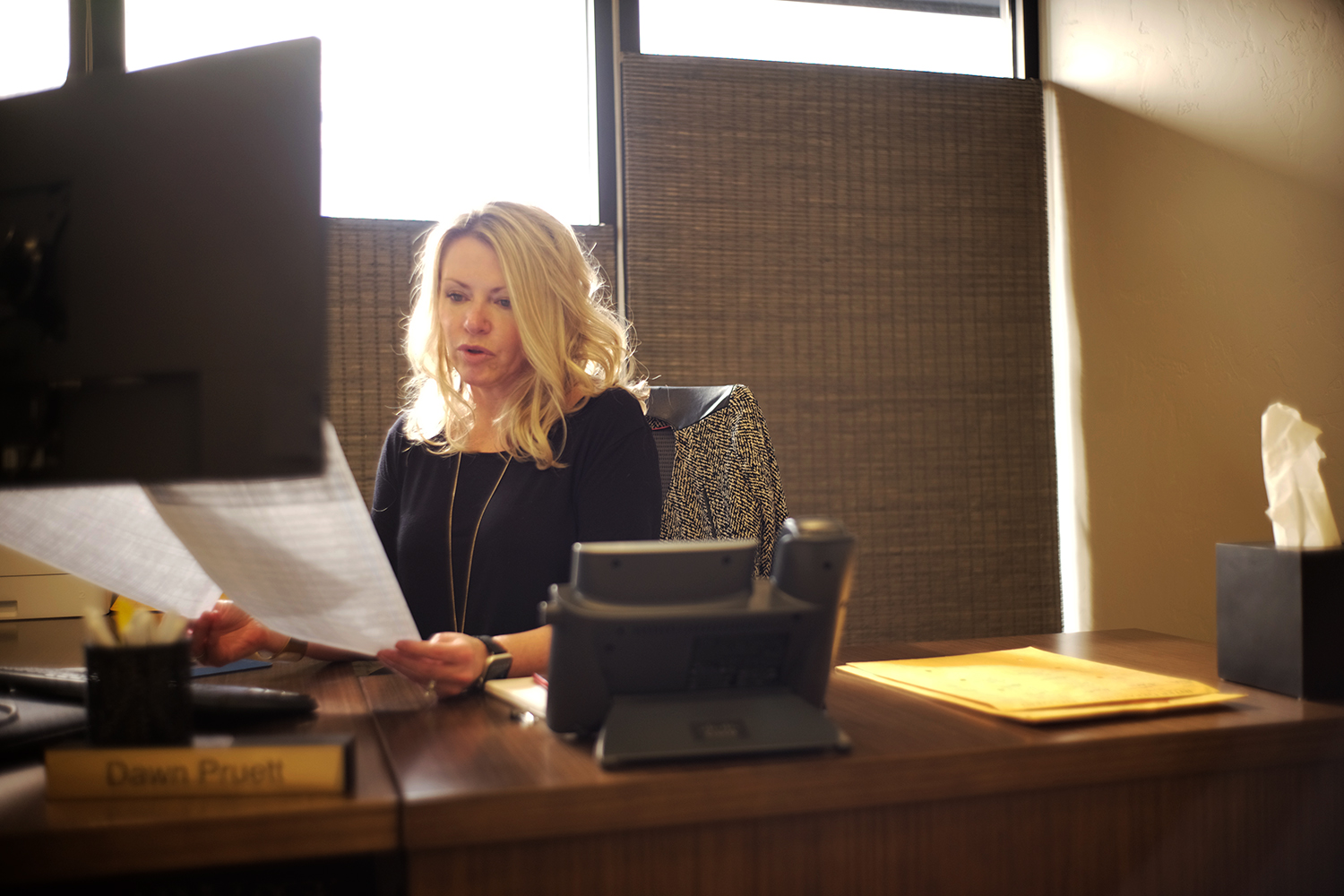
Every SBA application sees Dawn Pruett’s desk. Senior vice president at Bank of Jackson Hole, Pruett said the bank team has worked long hours and weekends since the application process began. On Saturday and Sunday, she came in at 7 a.m. and left at 6 p.m. (Alex Thompson)
At the Wort Hotel, Waldrop obtained the application from his bank the day it came out. He’s still sorting through everything but thinks it could be helpful. “It’s a pretty simple application, I’m thrilled to see.”
On paper, the loan appears a potential deus ex machina for small businesses. Under its terms, outfits like The Wort will be forgiven up to the loan’s full principal amount for the portion used for payroll, mortgage payments, utilities and other essential operating costs. To qualify, employee pay must cleave close to what it had been before COVID. The number of employees must also reflect historic non-COVID circumstances, but businesses have the opportunity to hire people back before June 30 to get the loan.
One hitch concerns J-1 visa eligibility. Under the current language, non-resident employee pay does not count. That impacts the loan limit for local hotels that employ large numbers of J-1 visa workers. Ryan suspects this wasn’t the intent, and the issue will likely go back to the Congressional Finance Committee for clarification.
“We’re setting up a production line for it. It’s a whole country applying for loans in a small window.” – Jim Ryan, president, Bank of Jackson Hole
According to the American Bankers Association, the SBA processed 100,000 loans on the first day, April 3, about the same as in all of 2019. CEO Rob Nichols told CNBC there are currently 2,200 lenders in the program nationwide, and that number is expected to grow. The ABA claims some banks are reluctant to take on new clients for these loans. So the Small Business Association and the Treasury are hashing out ways to allay their concerns.
In Jackson, the eight staff members of the Jackson Hole Chamber of Commerce have been on their phones at home seven days a week helping business owners understand these loans and navigate other options. Operations manager Riley Boone said so many people have called that they are conducting a webinar this week with Chris Eyler of the U.S. Chamber of Commerce.
Banking 24/7
Efforts to work on getting a trillion dollars-plus out there have been “pretty amazing” so far, said Bank of Jackson Hole’s Ryan.
With a recession snowballing down through the world economy, a speedy self-arrest is essential. The CARES Act streamlines the process for lenders like the Bank of Jackson Hole. Ordinarily, bankers must comply with strict underwriting, which includes things like credit reports and often takes place out-of-house. But the Paycheck Protection Program waives aspects of this process, giving the bank “preferred underwriting privileges,” Ryan said. Bankers can use the information they gather directly from a business to determine eligibility and loan amounts.
The PPP also holds banks harmless for businesses that fail to comply. “The examiners have reached out and told us that if there are issues with customers, because of this virus and them not being able to work, if they can’t make their payments they’re not going to downgrade our loans,” Ryan said.
Instead, federal loan examiners are “encouraging us to work with people.”
But with the unprecedented leap in closures and sudden unemployment, what flows freely in concept is up against a bottleneck of personnel numbers and data entry. In an eerie echo of overburdened hospitals racing against time to save patients, bankers are facing a flood of procedures to rescue businesses. Interaction in the coronavirus age is increasingly digitized, but it still comes down to people collecting applications—typing, analyzing, and formatting data.
“We’re setting up basically a production line for it,” Ryan said.
He urges applicants to be patient. “It’s a whole country applying for loans in a small window.” So expecting money in a day or two “is probably not a realistic expectation.”
Ryan has no way of knowing, but some number of weeks would be a good estimate. In the interim, the CARES Act says that businesses can apply to get disaster assistance loans directly from the federal government with $10,000 up-front to cover immediate expenses.
It’s a game of weighing out needs. “You know, somebody’s down to their last dollar versus somebody who still has some credit left—who needs it but can last another day or two.”
And like hospitals, all the other avenues of relief and care must keep going. Daily banking needs must be met, and “everybody in the world is trying to refinance their properties,” Ryan said.
Asking for Help
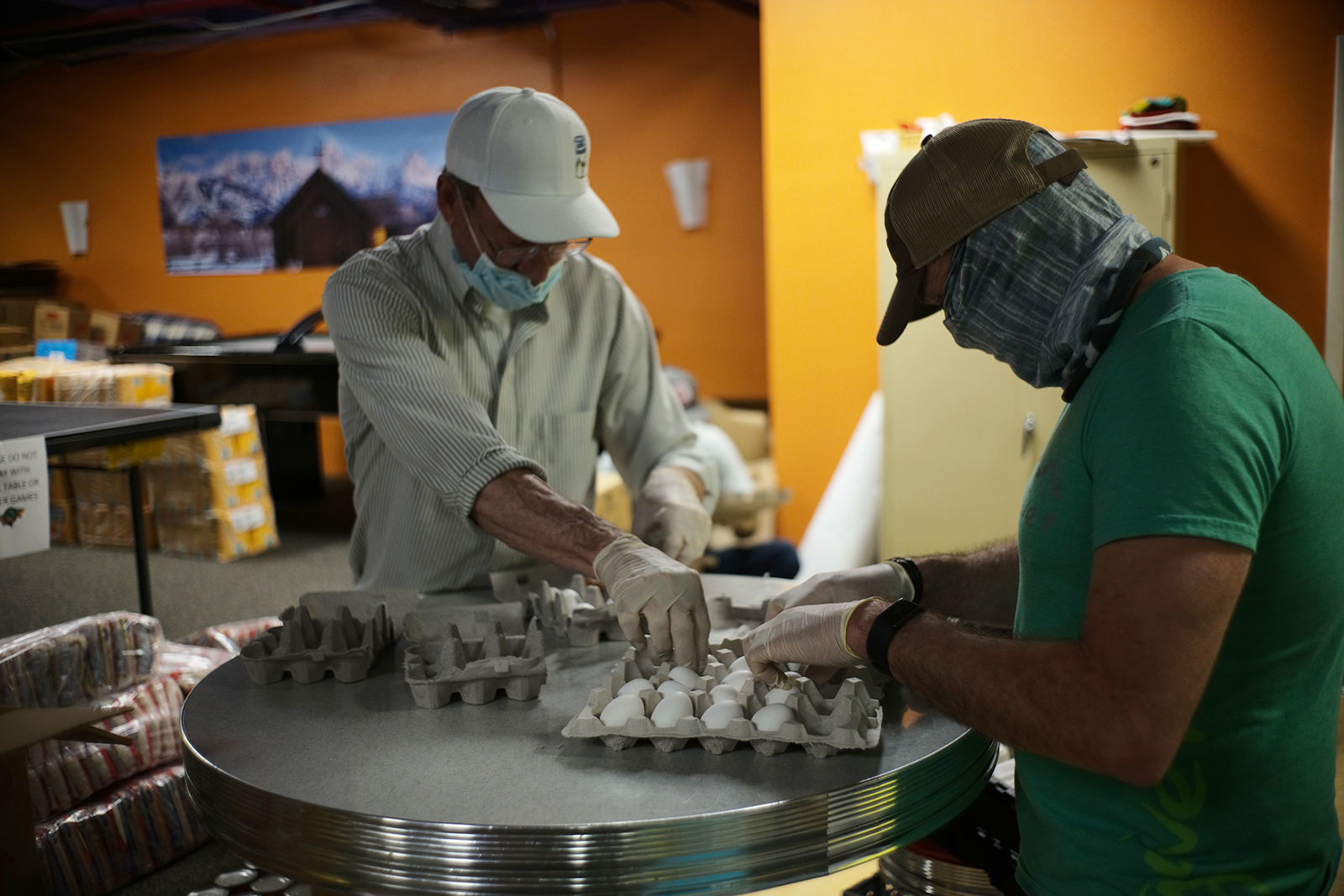
Mike Randall and Chris Tisi divvy up eggs at the Jackson Cupboard. The eggs arrived from the Food Bank of the Rockies in Casper, which buys discounted items from regional box stores. The Cupboard gets deliveries from various sources, including local grocers. (Alex Thompson)
So amid this unprecedented virus-driven reality, there is an economic rescue system evolving—albeit largely untested and overburdened. Like us, it is organic and messy; our entire socioeconomic system in an utterly new landscape—Washington’s army wintering across the Delaware.
Not everyone will find relief from this governmentally regulated system—either right away, or enough, or ever.
For one group of workers and their families, there is no state-designated net at all. Undocumented workers hold about 10% of restaurant jobs in the U.S. In Teton County, they are the backbone of the service industry. The CARES Act has no provision for them and they are not eligible for other forms of federal aid.
Fine said knowing his lobbying efforts on behalf of service industry professionals cannot help these people is “the most painful thing.”
For workers across the board, relief packages and the resumption of jobs may not come soon enough. At One22, a nonprofit that provides support and financial assistance to individuals and families, they normally work with about 140 financial aid applications annually.
Now, One22 is wading through more than 1,400 applications from people seeking financial help, said executive director Sharel Lund. As of April 2, One22 had awarded $560,000 in grant money to 560 people. The grants range in size but average $1,000 per person.
Most of One22’s funding comes from private grants and donations. The Community Foundation of Jackson Hole raised $1.4 million for its emergency COVID fund and is distributing that money to nonprofits like One22 that assist struggling residents. Some funding also comes from local government and a fraction from the federal government.
One22 awards grants to meet the needs of each applicant for the coming month after helping them find ways to use all means at their disposal. “So we’re not looking at whether they’re documented or not,” Lund said. “We’re looking at all the resources they have available to them.”
For people suddenly without a paycheck, the first thing Lund and her staff do is help assess untapped resources. They run down the list from unemployment insurance, CARES Act options, stipends, rationing money in savings accounts, employee assistance programs. “Or do they have any family support?” Lund said. “You know, could they move in with Mom and Dad? They might not want to, but could they?”
Sometimes it is a question of figuring out what payments can wait. “Can you negotiate with your landlord? Can you get on a payment plan with something? What’s negotiable and what’s not?”
It is the “time to call in all of your resources,” Lund said. “This is not a time to be a martyr or hero.”
Stacy Stoker, housing manager at the Jackson/Teton County Affordable Housing Department, said that about 75% of their tenants are asking for a reduction or deferment of rent. The housing department last week launched an application process for April rent deferral, with a payment plan over a term of three to 12 months depending on need. Stoker said the process will continue into May if necessary.
Lund said that in addition to helping with life skills like negotiating payment plans, One22 is seeing firsthand the challenges of managing life online in this new no-contact coronavirus world. The gaps of digital equity have deepened amid the pandemic, something that keeps Lund awake at night. “Either they don’t have a computer or they don’t have the internet or they don’t have digital literacy,” Lund said.
Other community help comes in the form of food aid. One of several organizations feeding people during the pandemic, the Jackson Cupboard has expanded its hours and loosened its referral requirements.
On a recent evening, a nattily-dressed waiter/snowboarder joined about a dozen people waiting in line for bags of staples, “a lot of vegetables,” kielbasa, hamburger, eggs, and cheese. He had never before visited a food pantry, or really cooked very many vegetables. “I’m going to figure it out tomorrow. Or today,” he said.
Since the pandemic, cupboard director Rachel Daluge said her numbers have more than doubled. “That’s what we’re here for. We’re dedicated to staying open in one way or another throughout this entire crisis,” she said.
Typically, roughly 15 people stop by on the days the cupboard distributes food, representing about 40 in terms of family members. Now Daluge is seeing about 40, meaning groceries for around 100 people.
The American ethos—that hard work will get the job done—is meaningless when there is no job. The consensus out there is that this could be a long haul: maybe the marathon metaphor will become an ultra. With no way to know, the recommendation across the board is for people to ask for help.
Lund of One22 sums it up: “A lot of seasonal workers take great pride in never having accessed unemployment. Our feeling is, this is not the time to do that.”
Count on KHOL for vital coverage during the COVID-19 pandemic. Your support ensures the future of this essential community service. Become a member today.


